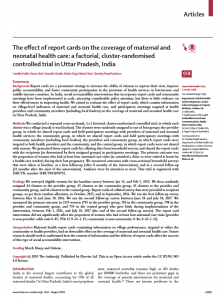
Background
Report cards are a prominent strategy to increase the ability of citizens to express their view, improve public accountability, and foster community participation in the provision of health services in low-income and middle-income countries. In India, social accountability interventions that incorporate report cards and community meetings have been implemented at scale, attracting considerable policy attention, but there is little evidence on their effectiveness in improving health. We aimed to evaluate the effect of report cards, which contain information on village-level indicators of maternal and neonatal health care, and participatory meetings targeted at health providers and community members (including local leaders) on the coverage of maternal and neonatal health care in Uttar Pradesh, India.
Methods
We conducted a repeated cross-sectional, 2 × 2 factorial, cluster-randomised controlled trial, in which each cluster was a village (rural) or ward (urban). The clusters were randomly assigned to one of four groups: the provider group, in which we shared report cards and held participatory meetings with providers of maternal and neonatal health services; the community group, in which we shared report cards and held participatory meetings with community members (including local leaders); the providers and community group, in which report cards were targeted at both health providers and the community; and the control group, in which report cards were not shared with anyone. We generated these report cards by collating data from household surveys and shared the report cards with the recipients (as determined by their assigned groups) in participatory meetings. The primary outcome was the proportion of women who had at least four antenatal care visits (ie, attended a clinic or were visited at home by a health-care worker) during their last pregnancy. We measured outcomes with cross-sectional household surveys that were taken at baseline, at a first follow-up (after 8 months of the intervention), and at a second follow-up (21 months after the start of the intervention). Analyses were by intention to treat. This trial is registered with ISRCTN, number ISRCTN11070792.
Findings
We surveyed eligible women for the baseline survey between Jan 13, and Feb 5, 2015. We then randomly assigned 44 clusters to the provider group, 45 clusters to the community group, 45 clusters to the provider and community group, and 44 clusters to the control group. Report cards of collated survey data were provided to recipient groups, as per their random allocation, in October, 2015, and in September, 2016. We ran the first follow-up survey between May 16 and June 10, 2016. We ran the second follow-up survey between June 18 and July 18, 2017. We measured the primary outcome in 3133 women (795 in the provider group, 781 in the community group, 798 in the provider and community group, and 759 in the control group) who gave birth during implementation of the intervention, between Feb 1, 2016, and July 18, 2017 (the end of the second follow-up survey). The report card intervention did not significantly affect the proportion of women who had at least four antenatal care visits (provider vs non-provider: odds ratio 0·85, 95% CI 0·65–1·13; community vs non-community: 0·86, 0·65–1·13).
Interpretation
Maternal health report cards containing information on village performance, targeted at either the community or health providers, had no detectable effect on the coverage of maternal and neonatal health care. Future research should seek to understand how the content of information and the delivery of report cards affect the success of this type of social accountability intervention.